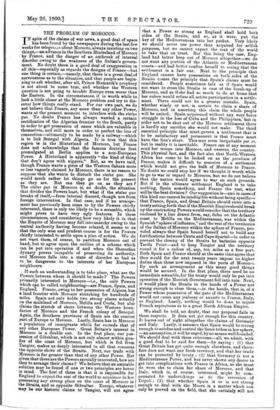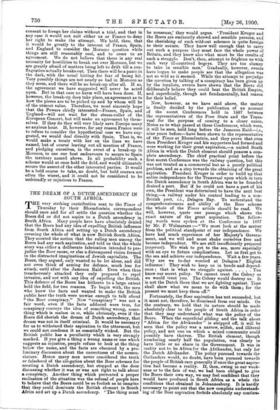THE PROBLEM OF MOROCCO.
IN spite of the claims of war news, a good deal of space has been found by the newspapers during the last few weeks for telegraus about Morocco, always insisting on two things,âan advance in the Southern Hinterland of Morocco by France, and the danger of an outbreak of internal disorder owing to the weakness of the Sultan's govern- ment. No doubt there is a good deal of exaggeration in all thisâespecially as regards the designs of Franceâbut one thing is certain,ânamely, that there is a great deal of nervousness as to the situation, and that people are begin- ning to ask whether, after all, Prince Bismarck's prophecy is not about to come true, and whether the Western question is not going to trouble Europe even worse than the Eastern. In the circumstances, it is worth while to look a little closer at the Morocco problem and try to dis- cover how things really stand. For our own part, we do not believe that France, any more than any other Power, wants at the present moment to interfere with the status quo. No doubt France has always wanted a certain rectification of the Algerian frontier to the South, partly in order to get possession of oases which are valuable in themselves, and still more in order to perfect the line of connectionâultimately to be made by a railwayâwhich is to link Senegal with Algeria. It is true that this region is in the Hinterland of Morocco, but France does not acknowledge that the famous doctrine first promulgated at Berlin applies to a non-European Power. A Hinterland is apparently "the kind of thing that don't agree with niggers." But, as we have said, though France wants a piece of the Western Sahara more or less vaguely claimed by Morocco, there is no reason to suppose that she wants' to disturb the status quo. She would much rather let things go on for the present as they are. But can they go on , as they are ? The status quo in Morocco is, no doubt, the situation that divides the Powers least, hut what if the status quo breaks of itself,âfrom internal discord, though not from foreign intervention. In that case, and if no arrange- ment has previously been come to by the Powers chiefly interested, there is only too likely to be a scramble, which might prove to have very ugly features. In these circumstances, and considering how very likely it is that the Empire of Morocco may fall into anarchy owing to the central authority having become relaxed, it seems to us that the only wise and prudent course is for the Powers chiefly interested to settle upon a plan of action. We do not want them, of course, to partition Morocco out of hand, but to agree upon the outline of a scheme which can be put into operation if and when the Shereefian dynasty proves incapable of preserving its authority, and Morocco falls into a state of disorder so bad as to be dangerous to the interests of her European neighbours.
If such an understanding is to take place, what are the Powers between whom it should be made ? The Powers primarily interested in Moroccoâi.e., the only Powers which can be called neighbouringâare France, Spain, and En glana. France, owing to her possession of Algiers, has a land frontier with Morocco stretching for hundreds of miles. Spain not only holds two strong places actually on the mainland of Morocco, Melilla and Ceuta, but also claims the stretch of shore between the Western boun- daries of Morocco and the French colony of Senegal. Again, the Southern provinces of Spain are the nearest part of Europe to Morocco. Lastly, Spain has in Morocco a population of immigrants which far exceeds that of any other European Power. Great Britain's interest in Morocco is a double one. In the first place, our pos- session of Gibraltar, which is not only almost within gun- fire of the coast of Morocco, but which is fed from Tangier, makes us deeply interested in all that concerns the opposite shore of the Straits. Next, our trade with Morocco is far greater than that of any other Power. But given that these are the Powers specially interested, how are they to arrange their claims ? We believe that an amicable solution may be found if one or two principles are borne in mind. The first of these is that it is impossible for England to expect the rest of the world to acquiesce in her possessing any strong place on the coast of Morocco in the Straits, and so opposite Gibraltar. Europe, whatever may be our historic claims to Tangier, will not agree that a Power so stroug as England shall hold both sides of the Straits, and so, as it were, put the key of the Mediterranean into her pocket. Very likely we should never use power thus acquired for selfish purposes, but we cannot expect the rest of the world to take that on trust. But this being the case, Eng- land had better keep out of Morocco altogetherâwe do not want any portion of the Atlantic or Mediterranean coastsâand had better confine herself to seeing that the settlement is a fair one. Next to the principle that England cannot have possessions on both sides of the Straits comes the principle that Spain's claims must be considered. People sometimes talk as if Spain would not want to cross the Straits in case of the break-up of Morocco, and as if she had so much to do at home that her rulers would refuse all active participation in a settle- ment. There could not be a greater mistake. Spain, whether wisely or not, is certain to claim a share of Morocco, and in asserting this claim the whole people will be united. Spain acquiesced without any very fierce struggle in the loss of Cuba and the Philippines, but in order not to be shut out of the Morocco settlement there is hardly any sacrifice she would not make. The third essential principle that must govern a settlement that is to be satisfactory and permanent is that France must have the lion's share. This may seem inequitable per se, but in reality it is inevitable. France can at any moment send her troops into Morocco, and overrun the country. This physical fact, and the fact also that North-Western Africa has come to be looked on as the peculium of France, makes it difficult to conceive of. a settlement which would not give the bulk of Morocco to France. No doubt we could stop her if we thought it worth while to go to war in regard to Morocco, but we do not believe that the nation would agree to war on such grounds. But if in the ultimate settlement England is to take nothing, Spain something, and France the rest, what willbe the best division? Our suggestion isâand in cases of this kind one cannot be intelligible without being specificâ that France, Spain, and Great Britain should enter into a treaty setting forth that if the Moorish Empireshould break up the contracting Powers would consider that the territory enclosed by a line drawn from, say, Sebu on the Atlantic coast to Melilla on the Mediterranean, was within the Spanish "sphere of influence," and the rest of the territories of the Sultan of Morocco within the sphere of France, pro- vided always that Spain bound herself not to build any fortifications between Ceuta and Cape Spartelâin order to prevent the closing of the Straits by batteries opposite Tarifa Pointâand to keep Tangier and the territory round it for a radius of, say, ten miles as a free port,. Both Spain and France should at the same time agree that they would for the next twenty years impose no higher duties than those now imposed in the ports of Morocco. By such an arrangement as this many good things would be secured. In the first place, there need be no immediate scramble, for the treaty would only be put into operation if the Moorish Government fell into ruin. Next, it would place the Straits in the hands of a Power not strong enough to close them,âin the hands, that is, of a Power whose possession of the gate of the Mediterranean would not cause any jealousy or anxiety to France, Italy, or England. Lastly, nothing would be done to injure French aspirations as to a great North African Empire.
We shall be told, no doubt, that our proposal fails in three respects. It does not get enough for this country. It leaves out of sight altogether the claims of Germany and Italy. Lastly, it assumes that Spain would be strong enough to subdue and control the fierce tribes in her sphere, âan assumption, it will be urged, by no means well founded. We should deal with these criticismsâall, we admit, with a good deal to be said for themâby saying : (1) that Great Britain has got quite enough elsewhere, and there- fore does not want any fresh territory, and that her trade can be protected by treaty ; (2) that Germany is not a Mediterranean Power, and has never shown any desire to get into complications with France in Africa, as she must do were she to claim her share of Morocco, and that Italy, which is, of course, interested, might be com- pensated by undertakings as to the reversion of Tripoli ; (3) that whether Spain is or is not strong enough to deal with the Moors is a matter which Can only be proved on the field, that she certainly will not consent to forego her claims without a trial, and that in any case it would not suit either us or France to deny her right to make the attempt. We hold, then, that it would be greatly to the interest of France, Spain, and England to consider the Morocco question while things are still reasonably cool, and to come to an agreement. We do not believe that there is any real necessity for hostilities to break out over Morocco, but we are greatly afraid of matters being left to drift till a con- flagration actually breaks out. Then there will be a panic in the dark, with the usual hitting for fear of being hit. Very possibly things are not nearly so bad in Morocco as they seem, and there will be no break-up after all. If so, the agreement we have suggested will never be acted upon. But in that case no harm will have been done. If, however, the break-up does take place, an agreement as to how the pieces are to be picked up and by whom will be of the utmost value. Therefore, we most sincerely hope that the Powers chiefly interestedâFrance, Spain, and Englandâwill not wait for the steam-roller of the European Concert, but will make an agreement by them- selves. If they do they will very likely save Europe many an anxious hour. If, however, for any reason France were to refuse to consider the hypothetical ease we have sug- gested, we would deal directly with Spain. That is, we would make a treaty with her on the lines we have named, but of course leaving out all mention of France, and pledging ourselves, in the event of a break-up in Morocco, to use our best endeavours to secure to Spain the territory named above. In all probability such a scheme would at once hold the field, and would ultimately secure the assent of the other interested parties. It would be a bold course to take, no doubt, but bold courses are often the wisest, and it could not be considered to be unfriendly or injurious to France.







































 Previous page
Previous page